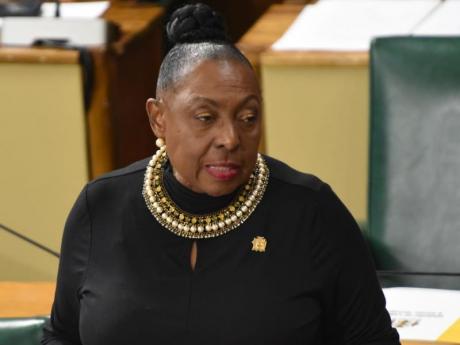(Jamaica Gleaner) Minister of Culture, Gender, Entertainment and Sport, Olivia Grange, says legislation will be tabled next week in Parliament to impose tough penalties on the perpetrators of domestic violence who use a firearm to carry out their reprehensible acts.
She told lawmakers yesterday that the bill which will amend the Domestic Violence Act will also include fines for breaching a protection order.
However, the bill will be subject to review by a joint select committee and is expected to receive submissions from various stakeholders.
Responding to queries about recommendations made several years ago by a joint select committee of Parliament to amend the Domestic Violence Act, Grange told lawmakers that the legal drafters had now completed the bill.
Grange said that members of a joint select committee who will review proposed amendments and receive submissions from stakeholders will be named during the sitting of the House of Representatives next week.
Opposition leader Mark Golding said that a plethora of amendments to the Domestic Violence Act were made by a joint select committee several years ago but to date no adjustments had been made to the law.
“That committee felt strongly that the Domestic Violence Act was insufficient as a legislative framework to address the cultural and sociological, economic and emotional issues that surround gender-based violence and domestic violence in particular,” Golding said.
He said the committee also felt that domestic violence should be examined more deeply, “not just in relation to criminal offences but on the whole issue of how victims of such violence can be supported and obtain redress through a system that is sensitive to their needs”.
Golding wanted to know when an in-depth review of the Domestic Violence Act would take place.
Grange responded to questions following a statement to Parliament on Tuesday to mark the International Day for the Elimination of Violence Against Women which was observed on November 25. It also signalled the start of the 16 Days of Activism against Gender-based Violence which is observed annually up to December 10.
In her remarks, Grange said that the campaign against gender-based violence calls on Jamaicans to “show how much they care about ending violence against women and girls. It also requires that governments and other stakeholders worldwide make huge investments in gender-based violence prevention”.
The local theme, “From Response to Preparedness: Eliminating Gender-based Violence in Jamaica” aims to highlight Jamaica’s commitment and responsiveness in addressing gender-based violence.
The Women’s Health Survey, commissioned by UN Women, in partnership with the Inter-American Development Bank (IDB), reveals that approximately one in four Jamaican women has experienced intimate partner violence during her lifetime.
Grange noted that domestic violence remains a major concern, often under-reported owing to fear, stigma, lack of support or fear of reprisals.
“Sexual violence is alarmingly prevalent, affecting one in three women, and includes rape, incest, and sexual harassment as well as other forms of violence, such as sexual abuse, exploitation and discrimination,” she said.
The Gender-based Violence (GBV) Helpline Unit has dealt with 7,466 cases, with 5,227 females and 2,239 males or 70 per cent females and 30 per cent males.
Through the GBV Helpline Unit, persons affected by GBV, can obtain access to essential services 24/7 (all night and during public holidays) through referral pathways, such as health, policing, justice and social services to assist with specific survivor needs.






